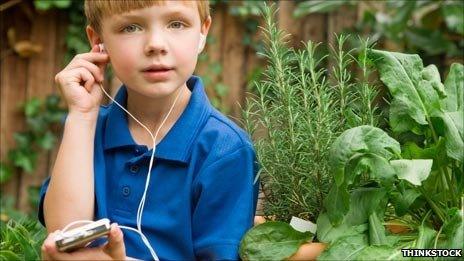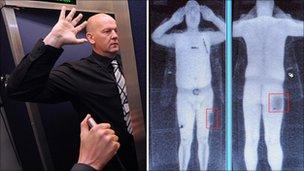Step away from the iPod
- Published

Teachers will be able to search pupils for iPods and phones
The government thinks phones and MP3 Players are too dangerous to be allowed in schools. Bill Thompson disagrees.
Later this week I'll be at the Latitude Festival in Suffolk, one of the nicest and easy-going events around, enjoying Florence and the Machine, Tom Jones, Robin Ince and Luke Wright in the wonderful setting of Henham Hall.
I'm looking forward to wandering from stage to stage, to the variety of musical styles, the cabaret, the poetry and of course the multi-coloured sheep that grace the fields around.
As with most big events these days there'll be a bag search for everyone entering the site, looking for items like glass bottles - which break too easily - knives and illegal drugs.
But it seems I should also expect to lose some other items from my bag, like my iPod and my mobile phone.
After all, if the new Schools Minister considers them to be too dangerous to be allowed in school they should probably be banned everywhere.
This new policy was announced on 6 July in a written statement to Parliament from Schools Minister Nick Gibb, whose responsibilities include "Behaviour and attendance" and "bullying", though that presumably refers to reducing bullying rather than being too bossy with his civil servants.
He wants to extend the powers that teachers currently have to search pupils for knives or other weapons, and has told schools that from September they will be allowed to search for alcohol, controlled drugs, and stolen property.
Troublemakers
However he also plans to add to the list of items which are considered so undesirable or dangerous that students must be forced to surrender their civil liberties and allow teachers to search them.
From the autumn this will include fireworks, legal highs - ie completely legal chemicals - pornography, cigarettes and "personal electronic devices such as mobile phones, MP3 players and cameras".
Press coverage of the proposed new powers has been overwhelmingly positive, with The Daily Mail announcing that "Teachers will be given the power to confiscate phones and iPods - and anything else they view as disruptive" and noting that "ministers believe that current confiscation powers are too vague and weak, leaving staff and pupils at the mercy of classroom troublemakers".
I can see why keeping fireworks off school premises is a good idea, but it is hard to justify the indignity of a personal search, with all that it entails for the relationship between a student and the staff, to search for legal items that the school just doesn't like.
Phones and MP3 players aren't actually considered dangerous, of course.
Improving behaviour
If you want to throw something at a fellow student or a teacher then a mobile phone is too expensive and not particularly aerodynamic, so you're better off getting your hands on a cricket ball or a javelin, both designed for the purpose and generally approved of on school premises.

School searches will be as useful as those at airports, says Bill
And the searches are unlikely to be effective, as phones are quite easy to hide.
This is really just a form of discipline theatre, exactly like the ineffective, expensive and demeaning security theatre that has infected airports, where shoes and belts are removed to turn us into shuffling barefoot drones at the service of scanning staff and we must all consent to microwave scanning that presents our naked images to those charged with keeping us safe.
It will do nothing to improve behaviour in schools where teachers are not respected by their students.
However, it could have a negative impact in other ways, as it enforces the idea that schools are places where "technology" is something out there, a word processor or spreadsheet on a desktop PC to be used for a particular purpose, instead of something that permeates all aspects of our daily lives and is becoming increasingly important.
Back in 2008 I wrote , external about the innovative ways mobiles were being used in teaching despite the ban on their use in class, and claimed that "the current restrictions are absurd, and will not last much longer'"
It seems I was wrong, and that we're instead going to see alienated and disaffected students being searched for their mobiles instead of being encouraged to find positive uses for the technology that is already in their pocket.
Digital Champion Martha Lane Fox might like to reflect that her campaign to get millions of people online in time for the 2012 Olympics is likely to rely on mobile access to government services, and that teaching the current generation of schoolchildren that mobile phones are the equivalent of fireworks and pornography could be giving them the wrong message.
Unless this is a cunning plan to make the latest generation of smartphones as cool as the other contraband, of course. But I rather doubt that was the intention.
Bill Thompson is an independent journalist and regular commentator on the BBC World Service programme Digital Planet. He is currently working with the BBC on its archive project.